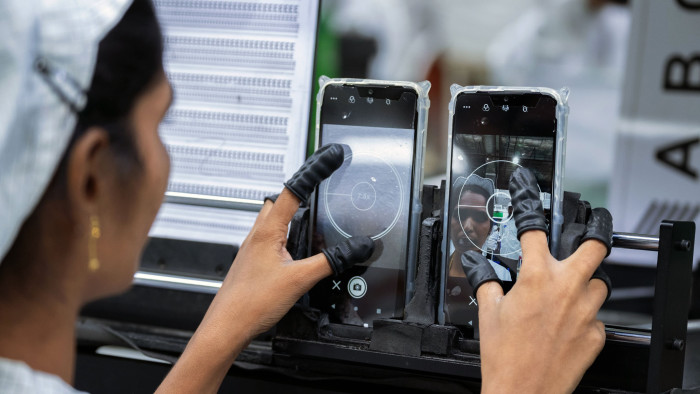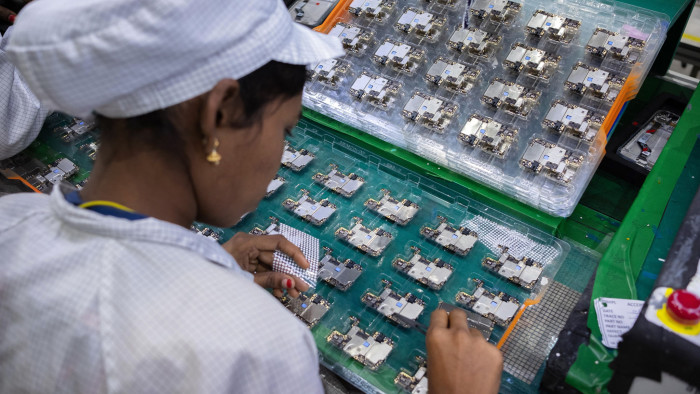Why India’s global ambitions require more pursuit of WEF principles

Roula Khalaf, Editor of the FT, selects her favourite stories in this weekly newsletter.
This year’s World Economic Forum theme of Stakeholders for a Cohesive and Sustainable World is a timely call in an age of dramatic political, technological and environmental changes. Such challenges are felt as acutely in India as anywhere in the world.
The “good days are coming”, tweeted prime minister Narendra Modi when he first took office in 2014. Yet as political turmoil increases over a controversial citizenship law that critics say is anti-Muslim, the once fast-moving economy has wound down. India’s desire to be a global power could rest on it pursuing WEF principles such as co-operation, innovation and inclusion.
Jaideep Prabhu, professor of marketing at Cambridge Judge Business School, says investment in infrastructure “to the tune of several trillion dollars over coming years” is needed to boost a sluggish manufacturing sector.
Yet the Indian government’s coffers are depleted because of lower than expected tax revenues, making outside sources are all the more important, says Mr Prabhu.
“India will need to be open and facilitate that kind of [foreign direct] investment,” he says.
Ruth Kattumuri, co-director of the India Observatory at the London School of Economics sees positive signs. FDI has been “growing for the last decade or so, and lots more in the last five years as well”. FDI flows in the service sector — which accounts for over 50 per cent of GDP — were up 37 per cent in 2018-19 compared with 2017-18.
Beyond FDI, trading relations with other countries will be key with global and Indian protectionism increasing. That said, Abhijit Mukhopadhyay, senior fellow at the Observer Research Foundation, an Indian think-tank, argues that India remains less protectionist than, for example, the US or UK.
Perhaps India’s greatest source of trade tensions is China, its third biggest market and largest source of imports. “India trades with China to the tune of about $100bn per annum but there is an imbalance,” says Mr Prabhu.
In the last decade or so, notes Mr Mukhopadhyay, India’s trade deficit with China has multiplied 13 times, and sits at about $53bn. In 2018, it was considered a serious enough issue for India to raise it at the World Trade Organization.
Fears over the deficit worsening prompted India in November to refrain from joining the Regional Comprehensive Economic Partnership, a free-trade deal including Association of Southeast Asian Nations members, Australia, China, Japan and South Korea.
But Mr Prabhu sees trade between Beijing and New Delhi continuing to grow. “Increasingly, Chinese companies are setting up manufacturing in India,” he says. Among them is Chinese phonemaker Foxconn, which has a manufacturing presence in southern India.

“India will be looking to grow its trade relations with other countries beyond RCEP,” says Ms Kattumuri. Among the opportunities is the EU, which she says has been “underexplored” by India for years. Ugo Astuto, EU ambassador to India, said in October that a strategic partnership with India could help to foster “fair globalisation”.
In spite of Britain’s planned exit from the EU, Ms Kattumuri says India has an opportunity to work constructively with the UK, especially in the service sector and with new technologies.
Indian FDI in Britain is likely to remain strong, says Mr Prabhu, although uncertainty lingers about the fallout from Brexit: “Companies are having to choose between locating in the EU or Britain.”
Elsewhere, “India should try its best to create vibrant and dynamic trade relationships in south and east Asia and Africa,” argues Mr Mukhopadhyay. At present, the country lacks a clear road map for new deals “as far as trade, export-import, or overseas investment policies are concerned”.
But not all issues require outside assistance. Mr Prabhu points to India’s need to develop affordable answers to domestic problems. With inclusion key to its future, this includes crafting cheap and clean energy networks for remote rural communities, providing bank accounts to the millions of people who lack them, and offering better education and healthcare.
Such means can increase the living standards of that large part of the Indian population that is outside the formal economy, says Mr Prabhu. “It can also increase general economic activity, building internal innovation.”
Vast numbers of workers need to be upskilled in sectors such as manufacturing. Mr Mukhopadhyay says the Modi government’s “Skill India” programme, launched with much publicity in 2014, failed “due to faulty planning and huge gaps in implementation”.
Hopes for this to be more successfully implemented after Mr Modi’s re-election have yet to materialise. Increasing political instability as protests grow against the citizenship law risks becoming a substantial economic “dampener”, says Mr Mukhopadhyay.
He worries that Mr Modi’s focus on politics and his Hindu nationalist project are distracting the government. “If that continues, then along with economic development, the effort to skill workers will also undoubtedly vanish.”

Comments